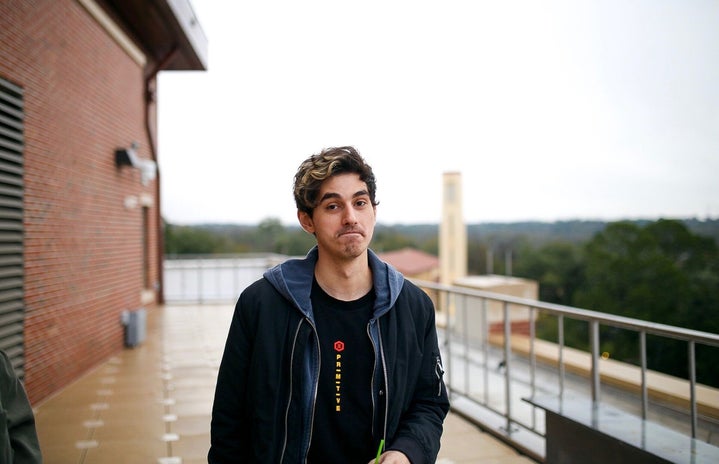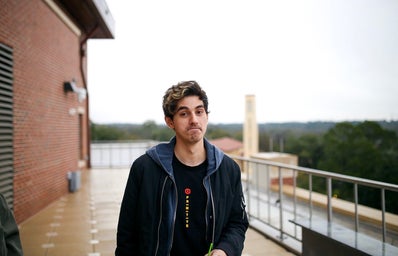You may know him as the friendly barista at Paper Fox Coffee, but this FSU graduate has more to offer than just his espresso machine skills. Wyatt Jordan, 23, graduated from FSU in the spring of 2019 with an environmental science degree and ultimately cites climate change research as his career goal. In the meantime, he writes and creates original music, fulfills the role of The Cute Barista at Paper Fox (Every coffee shop needs at least one.) and he cohosts a climate change podcast called No Planet B. No Planet B’s Spotify bio reads: “A chaotic look at the catastrophe of climate change. Education about the basics, provided by two unprofessionals just trying to learn.” With episode titles like “Garbage Patch Kids,” “Hot Bean Water Just Got Hotter” and “Awwww Shucks, It’s Climate Change,” it’s safe to say that chaos is exactly what it is, but in the best, most organized way. Wyatt and his cohost Breanna tackle a tough subject, with lots of science-y terms and difficult concepts, but they do it in a way that is easy to understand for us dummies without environmental science degrees. And with climate change’s impending threat on all of our livelihoods, this kind of widespread education is more important than ever.

Her Campus: What made you decide to start No Planet B?
Wyatt Jordan: I had no plans to start a podcast. It was a class project that a friend of mine and I just got really into as we were doing it. The people that were in our group – you know how most group projects have weird dynamics and can be kind of frustrating? This was literally the opposite. We all just sort of fed into each other and it worked out really well. We were really happy with it. All the guests we interviewed were super into it and all of us just had a decent amount of fun, so we just kept it going.
HC: What are your plans for it in the future? Do you just want to keep making it for fun or do you want to make it a big thing?
WJ: I want to use it as an excuse to do cool sh*t. It’s fun, but also there’s a future in it. Talking to researchers or talking to professionals is just fun. They always have a sense of humor. We interviewed a coffee farmer who invited Breanna [Wyatt’s cohost] and I to his coffee farm in Colombia, so we’re planning a trip to go do that to go see how coffee is grown. I want to travel to places to interview folks because it’s just an excuse to travel if I have the means, which is what we’re starting to see from No Planet B. We just got our first sponsor, which means they pay us to mention their product at the beginning of the episode. So, it’s fun and now it’s starting to become a little bit profitable. A little bit, but I’d like to see it keep building up. Right now, it’s kind of a side hustle. I hope it just keeps building while I do other sh*t.

HC: What kind of topics do you guys usually talk about?
WJ: We try to talk to anyone who is or will be affected by climate change, or people who can teach us about the effects of climate change. So, we’ll sometimes talk to researchers who will say “this is what’s happening, here’s what we’ve noticed.” Or it’s someone whose livelihood is going to be affected by it and they can say “here’s what’s happening.” So, we’ll talk to researchers first who will say flowers are being affected in certain ways, or we’ll talk to an oyster farmer, for example, who will say “these storms are actually affecting us in this specific way.” We try to get the knowledgeable part of it, but also the empirical part of it.
HC: What’s been your favorite episode so far?
WJ: They’re all so different. I met a friend of mine – he’s a friend of mine now – but I met him at a bar, and it turned out he’s an astrophysicist and he was like, “I can do an episode with you if you want.” And then we did the astrophysics episode and he talked to us about how the climate on Saturn and the climate on Mars can teach us about climate change on Earth. It was a fun interview and also just a fun story.

HC: How did studying at FSU prepare you for the podcast?
WJ: Doing my undergrad in environmental science gave me the vocabulary to be able to talk to these folks. Anyone who’s in environmental science that I’ve talked to so far, I’ve been able to keep up with what they’re saying and also relay that to an audience that might not know stuff.
HC: You said you’re working on some research now. Is that a job you’re working at or is this something you do on your own?
WJ: I work with FSU. The geography department. There are a couple of different pieces of research that I do. It’s not specifically climate change, necessarily, but it is ecology and climate. One was about deforestation and how climate change is becoming more and more of a factor of deforestation that was in the past. And the other one was just longleaf pine growth relating to climate.

HC: So, as a barista, you obviously know a lot about coffee. Can you talk about the intersection between coffee and climate change?
WJ: Yeah, the species of coffee that is the most popular, that is in most coffees that we drink, is actually really sensitive to climate and the future of that specific plant – it’s called Arabica – and is kind of scary. It’s not that resistant and with climate change also comes the threat of more pests being able to take over those plants. So, it’s a little terrifying, but there’s a couple of different solutions out there. A lot of them just have to do with sustainable farming promoting biodiversity, because if you just have one plot of the same plant, they’re all going to die the same way. If you have a lot of different plants, they kind of work together, and they can help sustain each other and create an environment of resilience a little bit better. So, farmers that are promoting biodiversity are going to help a lot. There’s also the chance that we could use a different species of coffee called Robusta that doesn’t taste as good, but we can breed them together – Arabica and Robusta – to kind of get qualities from one to the other. There are also different varieties of coffee that are a little bit more resilient than others, so it’s going to be a matter of finding out what works and what doesn’t and trying to promote biodiversity. But with increasing temperatures and unpredictable weather patterns, farming is going to be harder.
HC: So, we’re going to switch gears: tell us a little bit about your music. Are you in a band or do you do it on your own?
WJ: I do it on my own now. I got into it through being in a band. Now it’s usually just me writing stuff, having other people collaborate for either input or to record vocals or record guitar or something and just putting a song together and putting it on Spotify. That one’s the least profitable of my side hustles. Technically, I think I get royalties from people who play it on Spotify, and it’s like enough to buy me a lunch in a whole year or something like that.
HC: Do you have any plans for your music or is it just a hobby for you?
WJ: That’s another thing that I hope grows a little bit. There’s a lot of music writing that I do for No Planet B and a lot of audio editing that I do, so my ability to do a lot of the stuff is like I’m still doing it and if I just keep writing music and putting out songs I hope that also builds. Getting to work with it with No Planet B is probably the most I do right now, but it’s really fun.
If you’re interested in learning more about climate change, make sure you check out No Planet B on Spotify. You can also follow Wyatt on Instagram at @WyattOuray or stop by Paper Fox for coffee and some good ol’ climate change discussion!
Want to see more HCFSU? Be sure to like us on Facebook and follow us on Instagram, Twitter and Pinterest!



